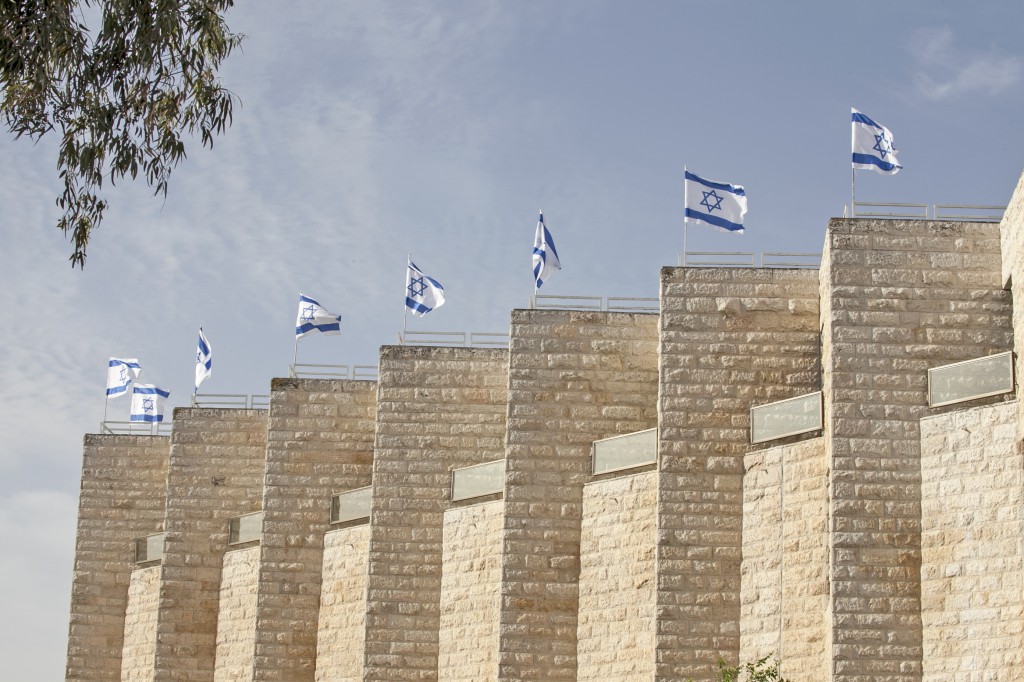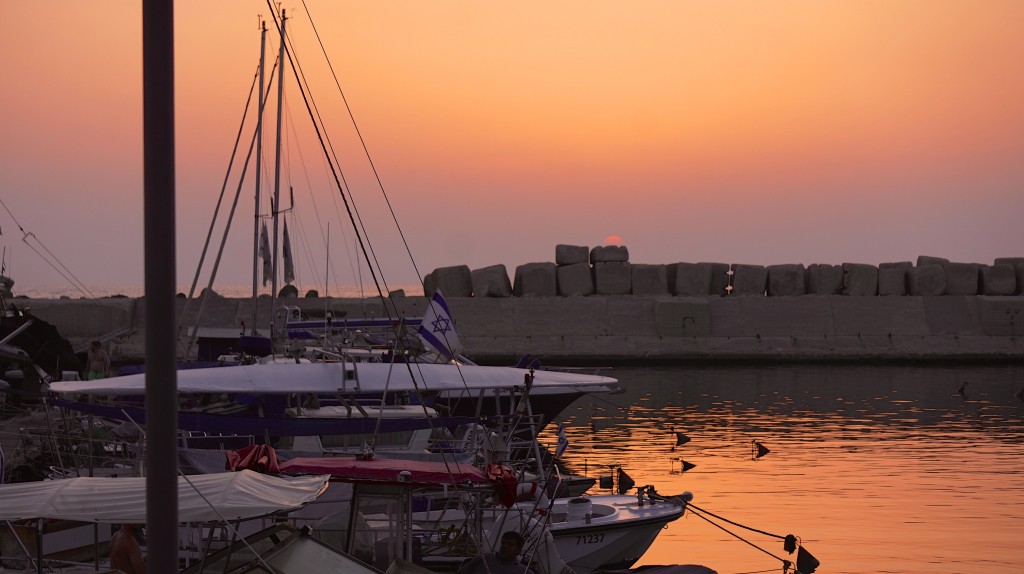One of America’s top rabbis reminds us that we will never understand the recent war without keeping a clear eye on the basic truths about what Israel is, and what its enemies really are.
The story is told of a visitor to Jerusalem’s Biblical Zoo who saw that each enclosure bore a sign with a pertinent biblical quotation. One quoted Isaiah: “[T]he wolf and the lamb shall dwell together.” Across the moat separating the animals from visitors, he saw that a wolf and a lamb were, indeed, resting peaceably, side by side. Amazed, he sought out the zookeeper and asked how that was possible. “It’s simple,” the zookeeper replied. “Every day we put in a new lamb.”
This tale captures the chasm that separates the ideal world that Jewish tradition commands us to seek and the real world we inhabit. This past summer, that chasm seemed wider than ever, as Israel found its cities and citizens under relentless, indiscriminate bombardment, and terrorists swarmed through tunnels to kill and kidnap. Hamas’ instigation of hostilities and its refusal to accept or honor a series of ceasefires compelled Israel to defend itself, with the awful consequences that war always brings. Before memories of that conflict recede, some its fundamental facts and their implications must be recognized.
First, some fundamental facts about Israel: Israel is deeply invested in peace and wants a better life for all. Having known little but war since it was born in 1948, no country yearns for peace more passionately than Israel. That is why it gave up the entire Sinai for peace with Egypt, made peace with Jordan, left Lebanon, left all of Gaza, and offered 97% of the West Bank for a Palestinian state. Israel seeks only to live within secure and recognized borders, in mutual recognition and respect with its neighbors, its children free from fear and violence, their future defined by peace rather than devastated by war. It wants the same for Palestinians and their children. The ongoing conflict is tragic for both Israelis and Palestinians. None of it needs to be happening.
A fundamental fact: Israel has the right to exist. It sickens me to have to say so. What other nation is asked continually to justify its existence? It is an obscenity. But make no mistake: Israel’s conflict with Hamas, Hezbollah, Iran, and other Islamic extremists is not about its borders or settlement policy or anything Israel does or doesn’t do. The conflict exists because the Jewish State exists. As Hamas puts it in its charter, “Islam will obliterate [Israel] just as it obliterated others before it.” Israel is the Jewish People’s ancient, present, and eternal homeland. It is so by Divine promise and irrevocable covenant; by millennia of prayers and dreams, backbreaking labor, survival, and sacrifice; by history and destiny, lawful decree and the rightful exercise of self-defense. No amount of ideological fanaticism, polemical propaganda, pathological hatred, terrorist violence, or historical revisionism can make it otherwise. The simple but profound idea, that the Jewish People, like other peoples, is entitled to a nation-state of its own, is Zionism. In a world with 57 Islamic states and 20 that are officially Christian, there is one Jewish state, and it’s here to stay.

A soldier carries an Israeli flag at a gathering point near the border with Gaza, July 19, 2014. Photo: Nati Shohat / Flash90
A fundamental fact: Like every nation, Israel has the right and duty to defend itself and its citizens. Interviewed on a German radio station during the recent conflict, Amos Oz, the renowned Israeli author, began by presenting two questions to listeners. “Question 1: What would you do if your neighbor across the street sits down on the balcony, puts his little boy on his lap and starts shooting machine gun fire into your nursery? Question 2: What would you do if your neighbor across the street digs a tunnel from his nursery to your nursery in order to blow up your home or in order to kidnap your family?” The answers are self-evident.
A fundamental fact: National self-defense presents complex moral and tactical challenges; perfection is unattainable. Do you put civilians at risk or allow terrorists to act with impunity? It is an awful but unavoidable choice. In an op-ed for The Washington Post, Natan Sharansky asked, “Before the IDF bombs an area in Gaza, residents are alerted by radio, e-mail, phone and text message telling them to leave. The army also uses small warning missiles to let civilians know a real missile will soon be fired. Do other free countries go to similar lengths?” We all know the answer. Richard Kemp, formerly the British commander in Afghanistan, points out that the ratio of civilian to military casualties in the Gaza war was one-fourth the average in warfare around the world. “No army in the world acts with as much discretion and great care as the IDF. The U.S. and the UK are careful, but not as much as Israel,” Kemp said. The exercise of power is inherently problematic, and the death of any innocent person, especially a child, is tragic, but the calamities of Jewish history demonstrate it would be suicidal to trade the moral challenges of power for the moral purity of powerlessness.
Next, some fundamental facts about Hamas: First, its indiscriminate attacks on Israeli civilians and its use of Palestinian civilians as shields were war crimes. The rules of war require combatants to wear distinctive markings on their persons and vehicles and to stay away from non-combatants. Otherwise, they bear responsibility for the ensuing casualties. While Israel employed rockets to protect civilians, Hamas used civilians to protect rockets. By firing from mosques, a church filled with refugees, schools, hospitals, and clinics, and by urging non-combatants to ignore Israel’s advance warnings, Hamas pursued a PR strategy that President Clinton called “crass,” and “designed to force Israel to kill their own civilians so that the rest of the world will condemn them.” Agreeing, Face the Nation’s Bob Schieffer quoted Golda Meir: “We can forgive [them] for killing our children, but we can never forgive them for forcing us to kill their children.” How sad that, 40 years after she left office, her eloquent comment remains true.
A fundamental fact: Hamas’ PR strategy also involves deception, manipulation, and intimidation of the news media. Threatened with death, journalists in Gaza were afraid to report anything that departed from the Hamas narrative, which dictated that all Palestinian casualties be reported as “civilians” and blamed on Israel. As in prior conflicts, these will surely prove to be gross exaggerations or outright lies. If corrections emerge, they will be buried on back pages, largely ignored. The damage to Israel’s image will have been done.
A fundamental fact: Hamas is profoundly anti-Semitic. A prominent Hamas leader promoted the blood libel, a centuries-old pretense for the murder of Jews: “We all remember how the Jews used to slaughter Christians, in order to mix their blood in their holy matzos…It happened everywhere.” Amos Oz, in the German interview, was right yet again:
I read the charter of Hamas carefully. It says that the Prophet commands every Muslim to kill every Jew everywhere in the world. It quotes the [fictitious] Protocols of the Elders of Zion and says that the Jews controlled the world through the League of Nations and through the United Nations, that the Jews caused the two world wars and that the entire world is controlled by Jewish money…I have been a man of compromise all my life. But even a man of compromise cannot approach Hamas and say: “Maybe we meet halfway and Israel only exists on Mondays, Wednesdays and Fridays.”
A fundamental fact: Hamas seeks to take over the West Bank as it did Gaza. It was recently revealed that Hamas was plotting to overthrow the Palestinian Authority in the West Bank and carry out terrorist attacks on Israel from there. “If only the West Bank had one quarter of [the weapons Gaza has],” a Hamas leader declared, “the Israeli entity would end in one day.”
A fundamental fact: The Palestinians’ true enemy is not Israel; it is Hamas. By Hamas’ own estimate, more than 160 Palestinian children died constructing its tunnels. Hamas also murdered workers to keep the project secret. Palestinian Authority President Mahmoud Abbas reported that Hamas executed 120 Palestinian teens for curfew violations and over 30 alleged “collaborators,” all without trial or due process. Billions of dollars of aid to Gaza that could have been used to build schools, hospitals, roads, and the infrastructure of a better life were spent on tunnels and terror instead. Why? Because trying to kill Jews and destroy Israel is more important to Hamas than the lives of the Palestinian people.
Some fundamental facts about the region and the world: First, there is a new Middle East. Israel’s war with Hamas was more than a gruesome Groundhog Day sequel. This time, much of the Arab world, including Egypt, Jordan, Saudi Arabia, and the United Arab Emirates, supported Israel. They all face a common threat from radical Islamists, including the Muslim Brotherhood, Hamas, Hezbollah, ISIS, and Iran. Iran’s surreptitious, advanced nuclear weapons program remains the greatest single threat to Israel, the region, the U.S., and the West. Israel is on the front line of this much wider and more lethal conflict. The new Middle East explodes the myth that the Israeli-Palestinian conflict is the region’s core problem. It is not and never has been. Though it needs to be solved, if possible, it would not end a 1,400-year-long clash within Muslim civilization, into whose vortex the world has now been drawn.
A fundamental fact: This new Middle East requires new thinking. The radical transformation of the region since the “Arab Spring” demands deep reflection, wherever one may be on the political spectrum. For conservatives, a key takeaway, as Prime Minister Benjamin Netanyahu’s conduct of the war showed, is that military force—even when necessary, fully justified, and carefully employed—can only accomplish so much, and has geopolitical costs, not just human and financial ones, that must be taken into account. For liberals, the lesson is: get real. I quoted Amos Oz precisely because he is a prominent leftist and peace activist. It is maddening that so much criticism of Israel from the Left focuses obsessively on its flaws—real, exaggerated, and imagined—while ignoring or rationalizing the misdeeds and failures of others. Where are Israel’s high-minded detractors when 200,000 people, including 50,000 civilians, are slaughtered in Syria? Where is the Presbyterian Church (USA), which voted to divest from companies that do business in Israel, when Christians in Iraq who won’t convert to Islam are decapitated? How, in good conscience, can those who call Israelis who defend themselves “war criminals” and “baby killers,” remain silent when Muslims ruthlessly rape, murder, kidnap, maim, and drive out other Muslim and Christian men, women and children?
In a column in Haaretz, Israel’s Left-leaning newspaper, Ari Shavit, author of the acclaimed book My Promised Land, offered a compelling explanation. He wrote,
It is difficult for the Western liberal to observe the new Middle East. His worldview is based on criticizing the West and granting sweeping amnesty to those who are seen as its victims.… So he demonstrated against the war in Vietnam, but kept silent in the face of the Khmer Rouge genocide in Cambodia. He opposed the wars in Iraq and Afghanistan, but kept silent in the face of the oppression in Iran. This is why he hastens to denounce Israel, while displaying leniency toward Hamas’ fascism.…The new Middle East is now raising penetrating questions that must generate an upheaval in liberal thought. Liberals can no longer ignore the awful plague of Middle Eastern brutality and the fact that millions of Arabs live with no rights and no future. While voicing justified criticism against Israel…they must lift their eyes and see the expanse in which Israel is located. An expanse in which Yazidis are massacred and Christians are persecuted and women are stoned. An expanse in which there is no democracy, or peace, or grace. This is a Middle East that liberals must see as it is—and deal with its diseases courageously.
A fundamental fact: Anti-Semitism and hostility to Israel are closely connected. Shavit’s challenge was anticipated by Ellen Willis, a leftist feminist rock critic for The New Yorker and The Village Voice, in a brilliant 2003 essay, “Is There Still a Jewish Question? Why I’m an Anti-Anti-Zionist.” Describing herself as “a quintessential Diaspora Jew,” Willis pointed out that while anti-Semitism is deeply embedded in “Christian and Islamic cultures, East and West, [that] point is particularly difficult to argue on the Left, where the conventional wisdom is that raising the issue of anti-Semitism in relation to Israel and Palestine is nothing but a way of stifling criticism of Israel and demonizing the critics.” However, “In the context of Left politics,” Willis wrote, “the dynamic is actually reversed: accusations of blind loyalty to Israel [and] intolerance of debate…are routinely used to stifle discussion of how anti-Semitism influences the Israeli-Palestinian conflict or the world’s reaction to it or the public conversation about it.” Noting absurd comparisons of Israel with South Africa and Nazi Germany, Willis wrote, “[T]he runaway inflation of Israel’s villainy aligns with ingrained cultural fantasies about the iniquity and power of Jews; …the traditional pariah status of Jews has been replicated by a Jewish pariah state.”
Willis’ analysis helps explain the worst anti-Semitic demonstrations and violence since the Nazi era, from both the far-Left and far-Right. “If there should be a mass outbreak of anti-Jewish violence,” Willis wrote prophetically, “it will no doubt focus on Israel, but it will not, in the end, be caused by Israel, and the hatred will not disappear if Israel does.” When Jews are assaulted and murdered in France, cries of “Jews to the gas!” are heard in Germany, Molotov cocktails are thrown at a synagogue once destroyed on Kristallnacht, kosher items are removed from the shelves of a British grocery chain, and Jewish kids on American college campuses receive hate mail and suffer harassment, it is clear that anti-Semitism and hostility toward Israel are soul mates.
Anti-Semitism is also deeply embedded in the BDS movement, which demonizes Israel, calling for boycotts, disinvestment, and sanctions against the Jewish State. In essence, BDS is the third phase of the seven-decade-long war against Israel. The first phase, as former Israeli ambassador to the U.S. Michael Oren points out, was “the attempt to annihilate Israel by conventional means” from 1948-73. The second “sought to cripple Israel through terror,” but was thwarted. The current phase seeks “to isolate, delegitimize and sanction Israel into extinction. And a key weapon in this stage is the hugely destructive word ‘apartheid.’”
A fundamental fact: Israel is not, and will never be, an apartheid state. In South Africa, apartheid imposed total segregation between whites and blacks by law, akin to the Jim Crow period in the American South. In Israel, no such laws have ever existed. Arabs vote, attend university, serve in the Knesset and on the Supreme Court, some even in the army. All over Israel, Jews and Arabs mix freely. Go to any mall, park, or hospital; you will see it is so. Arab Israelis have rights, protections, and opportunities unheard of in the Arab world. And the security barrier, vilified as an “apartheid wall,” was not erected to segregate Palestinians, but to save Israeli lives, Jewish and Arab alike, from suicide bombers. Branding Israel an apartheid state is a monumental, malicious lie. It does nothing to bring about Palestinian statehood and, in Oren’s words, does “a grave injustice to the millions of American and South African blacks who were the victims of true apartheid.”
A fundamental fact: The news media is an enormous part of the problem. In a widely lauded article in Tablet, Matti Friedman, formerly an Associated Press reporter and editor stationed in Jerusalem, cut to the heart of the matter:
The world is not responding to events in this country, but rather to the description of these events by news organizations….The international media’s Israel story…is a narrative construct that is largely fiction. If you follow mainstream coverage, you will find nearly no real analysis of Palestinian society or ideologies, profiles of armed Palestinian groups, or investigation of Palestinian government. Palestinians are not taken seriously as agents of their own fate….Many of the people deciding what you will read and see…view their role not as explanatory but as political.
That toxic fiction has saturated the world for decades and accounts for much of the anti-Israel agitation in the streets, on campuses, in social media, and elsewhere. But no matter how widely a Big Lie spreads or how much damage it does, it is still a lie.
What about the American Jewish community? There are Jews who share the anti-Western critique Shavit and Willis described and are among Israel’s most strident critics, but they represent a tiny fringe, far outside the mainstream. Driven by ideology, their minds are closed. A larger number of American Jews have yet to do the rethinking that the new Middle East requires and have been influenced to a greater or lesser degree by the fictitious narrative of Israeli oppression and Palestinian victimization. Those in this category have work to do. A third group, partially overlapping the second, are disappointed that Israel doesn’t live up to everything they imagined a Jewish state would be. While there are legitimate issues involved, they need to have more reasonable expectations. As Carlo Strenger, an Israeli psychology professor, self-proclaimed leftist, and Haaretz columnist, explained, “[T]he time has come to stop mourning Israel’s idealized image. Israel is an impressive achievement in many ways, but it was never an ideal society…Israel certainly needs to mature, but so do we Jewish liberals.”
As Voltaire advised, “Don’t let the perfect be the enemy of the good.” After 45 years of marriage, I am certain of my wife’s love for me, despite her well-justified critiques of my imperfections. As an American, I am well aware of this country’s flaws and critical of decisions by administrations of both parties. Nonetheless, I love America whole-heartedly. I feel the same way about Israel. My assessment of its shortcomings is dwarfed by the pride I feel at what is admirable, exemplary, even miraculous about the Jewish state. And when Israel is attacked, physically or verbally, I rise to its defense, as I would do for anyone or anything I love. With all my heart and soul, I believe that to be every Jew’s obligation.
The bottom line: Supporters of Israel must be realistic and vigilant, yet also hopeful and optimistic. Realistically, bias, unfair criticism, myths, anti-Semitism, and conflict will persist, just as bacteria thrive despite antibiotics. It is sometimes said that optimists believe this is the best of all possible worlds and pessimists are afraid they’re right. Jewish optimism is different; it accepts reality, but refuses to be defined or defeated by it.
Consider a song Hamas recorded in garbled Hebrew and uploaded to YouTube—Kum, Aseh Piguim—“Up, Do Terror Attacks!” Declaring “Death to Israel” and vowing to exterminate Jews like cockroaches, it became an unlikely, instant hit in Israel, the de facto anthem of its war effort. A young soldier explained, “This song is about what [Hamas] loves the most—they really want to see everyone dying and lying bleeding in the street like in the video. Which also happens to be what we hate the most. When people sing the song, they are looking that culture straight in the eye. They see the difference between them and us, and they know what this war is about and what they’re fighting for.”
Hadar Goldin certainly knew. The young soldier, who was thought, at first, to have been kidnapped by Hamas, before news emerged of his death, got engaged to be married just weeks before the conflict broke out. His grandfathers were Holocaust survivors who fought in Israel’s War of Independence. As Hadar said, “[E]veryone should know how to give of oneself, not necessarily in combat but in any area. You must always be prepared to carry the stretcher [to shoulder the burden] together, out of a commitment to the people and the country.”

A soldier places flags on the graves of fallen Israeli soldiers during a ceremony held at Jerusalem’s Mount of Olives in preparation for Memorial Day. Photo: Yonatan Sindel / Flash90
Realistic Jewish optimism is not an emotion; it is a value. It is not a prediction, but a profound, unselfish commitment. We, too, are called to realistic Jewish optimism. It is our privilege and sacred duty to stand with Israel and encourage others to do so, not because it is perfect—no nation is—but because its cause is profoundly just, and because it is ours. No matter how ignorant or misinformed some may be about the history and facts of the Middle East conflict, we must remain informed and inform others. We must fight anti-Semitism wherever it rears its ugly head. We must be critical consumers of media and speak up, speak out and advocate for Israel.
In the final analysis, we must, as Albert Camus wrote, “bear witness” to the truth and do what has to be done “in the never-ending fight against terror and its relentless onslaughts.” As we do, we must never stop hoping for peace, even in the midst of a seemingly intractable and endless conflict. For, as the great Israeli poet Yehuda Amichai put it, we are “infected by hope.” And as Maimonides taught, hope is the belief in the plausibility of the possible, not the necessity of the probable. Thus, we must struggle, and help others struggle, with the tension between the world as it is and the world as it ought to be. And as Jews have always done, we must refuse to yield to cynicism or despair, always believing in and striving toward a better, brighter future.
![]()
Banner Photo: Nati Shohat / Flash90







